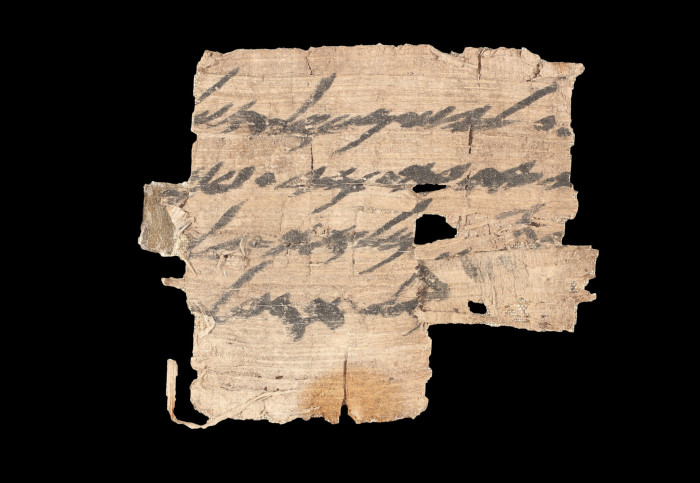American family donates rare 2,700-year-old papyrus fragment written to ‘Ishmael’ during biblical times

An American family that had a rare 2,700-year-old papyrus note on display in their home for decades, one of only three known fragments to be in existence in the world, has donated it to Israel by way of the Israel Antiquities Authority.
The tiny fragment, 1.5 inches x 2 inches, contains four lines written in ancient Hebrew during the time of the Old Testament kings that begins with the words "To Ishmael send" and the rest of the words are incomplete.
During a Christian mission to Israel in 1965, a woman was either gifted or had purchased the papyrus as a memento to keep after participating in an excavation.
“This papyrus is unique, extremely rare,” Eitan Klein from the IAA’s Theft Prevention Unit said, referring to the fragment written in Palaeo-Hebrew which is from the First Temple era, AFP reported, saying only two other papyruses from that period are known to researchers.
It had been stored in a cave in the Judean Desert for centuries and the dry climate there enabled its preservation, IAA said.
The First Temple era refers to the period from the construction of the temple under King Solomon to its destruction by the Babylonians in 586 B.C.
Klein was able to locate the papyrus in the United States with the help of professor Bruce Zuckerman of the University of Southern California, The Times of Israel said.
Zuckerman, who was in touch with leading epigrapher Ada Yardeni until her death in June 2018 and who was writing a book about First Temple-period Hebrew scripts, helped Klein locate the son of the U.S. owner of the papyrus in Montana.
Klein found that the fragment was either purchased by or given to the Montana resident when she visited Israel in 1965 as part of a Christian mission from the U.S. and participated in excavations around Qumran and met key people involved with the Dead Sea Scrolls, the newspaper said.
The papyrus hung on the wall of the Montana home for decades.
Klein then contacted the son, who requested to remain anonymous, and invited him to come to Israel with the papyrus as a special guest of the IAA. During the Montana man’s visit, Klein and his colleagues requested him to return the papyrus.
The son knew that the fragment was highly valuable but due to his Christian values and to memorialize his mother, he donated it to Israel, Klein said.
The “Ishmael” in the note does not refer to the son of Abraham who lived centuries earlier but instead to a man with that common name who lived during the First Temple era, Christian Headlines explained.
“It first appears in the Bible as the name of the son of Abraham and Hagar, and it is subsequently the personal name of several individuals in the Bible, including Yishmael ben Netanyahu, who murdered the governor Gedaliah ben Ahikam,” Shmuel Ahituv, a professor at Ben-Gurion University of the Negev in Israel who was the first to alert Klein about the existence of the papyrus, was quoted as saying.
“It also appears as the name of officials on paleographic finds such as bullae (clay stamp seals) used for sealing royal documents in the administration of the Kingdom of Judah, for example the bulla reading, ‘To Yishmael, son of the king.’ The present document probably certified a dispatchment either to, or from, Yishmael,” added Ahituv.



























